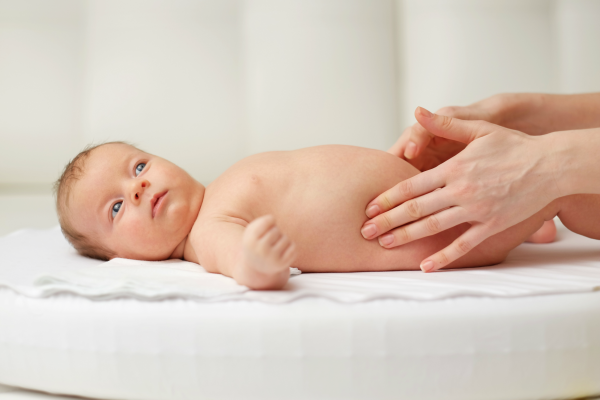
Listening to an infant suffer through gas pains can be tough for just about anyone. But for the new parents who are already exhausted, stressed, and frustrated, it can be especially difficult. If your baby is suffering with gas pains, don’t despair. There are plenty of things you can do to give your baby (and yourself) some relief.
How to Know If Your Baby Is Uncomfortable
First, you need to identify that the baby is indeed suffering from gas pains. All babies cry to a certain extent because it is their primary means of communication with those around them. But the cry associated with gas pains is different from a tired, hungry, or bored cry. A gas pain cry will be sharper and sound more frantic than others. You may also see the baby pulling up their legs in discomfort. With these two signs combined, you can be sure your baby is suffering from excessive gas.
What Causes Gas?
Gas pains are due in part to an immature digestive system. As the baby processes the nutrients from breast milk or formula, gas bubbles may form and get trapped in the stomach or intestines. Air bubbles can also be caused by swallowing air while nursing or drinking from a bottle, or even from excessive crying. When those bubbles get stuck, they can cause painful pressure in a baby’s tummy.
How to Prevent Gas

If your infant is suffering from gas pains, the first thing you can do is try to eliminate some of the gassiness from the breast milk or formula they consume. If you are breastfeeding, you may want to eliminate dairy, soy, and peanut products from your diet and then gradually reintroduce those products to see how the baby reacts. Also, try to stay away from beans and gassier vegetables like cabbage or broccoli, and minimize your caffeine intake. If you are formula feeding, you may need to experiment with different brands or types of formula.
You should also make sure that you are burping your baby regularly while they’re feeding. If your baby is drinking from a bottle, make sure that the nipple is the right size so that they’re not taking in too much air as they suck. Nursing mothers should also make sure that the baby spends enough time on each breast so that the baby gets through the foremilk—which is high in lactose and can cause gassiness—and gets to the rich hindmilk.
How to Remedy Gas Pains
Even with all of these things taken into account, some babies will still have a hard time with gas. The good news is that there are many different remedies for helping your baby through the discomfort. Here are some places to start.
“Bicycle” Their Legs
Position your baby on their back and move their legs in a bicycling motion. This puts a little pressure on their stomach that may move the gas through.
Make Time for Tummy Time
Give your baby regular periods of adult-supervised time on their tummies. Not only will this help move gas bubbles through, but it’s good for their head and neck development, as well.
Carry Them Around
Carry your baby either in the “football hold” (lying down on your forearm with their face cradled in your hand, legs straddling your elbow) or upright in a baby carrier or sling. This will put enough gentle pressure on their tummies to keep the gas moving
Try Infant Massage

Position the baby on their back and massage their tummy with your fingertips, rubbing in small, gentle, clockwise circles beneath their rib cage and down to their diaper area.
Use a Gas Aid
With your doctor’s approval, try gas aids such as simethicone (sold as Mylicon) to break up the gas bubbles. You can also try gripe water, a natural homeopathic remedy with herbs to aid digestion.
Of course, if your baby is still struggling after attempting these remedies, seek advice from your doctor. If you are worn out from caring for a fussy infant, find someone who can give you a short break. And remember above all that this is just a brief phase that will pass as their digestive system matures. Soon, the crying will become a distant memory replaced with smiles and happy cooing.
